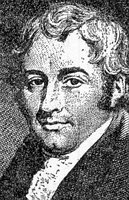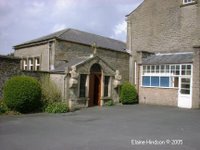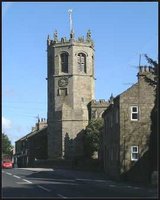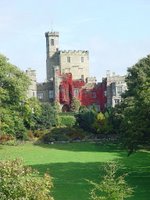Day 12: Hornby, Lancashire (John Lingard)
As life gets back on an even keel it's time to venture on with our travels. Today we are heading north again to Hornby in Lancashire - another new destination for me. A year or so ago I discovered John Lingard (1771-1851), who combined life as a rural priest with a career as a pioneering Catholic historian of international reputation. Among other works he wrote a ten volume History of England that was some hundred and fifty years ahead of its time - many of his conclusions match those of recent historians. In the nineteenth and early twentieth centuries the writing of English history was dominated by a series of "Whig" historians who portrayed it as a story of steady progress culminating in the greatness of Victorian England and the British Empire. Protestantism was seen as an essential part of this progress, not so much through religious conviction, but because it permitted English independence from the influence of Rome. Lingard painted a very different picture, and one that was for a century or more thoroughly unfashionable outside of Catholic circles. Nowadays his work is almost unknown, but a recent biography justifiably describes him as the greatest English historian of the second millenium. (If you are wondering, the greatest of the first millenium was the Venerable Bede.) Unfortunately his books are now almost unobtainable at an affordable price, so what I know of Lingard I have learned from his biographer, but I'm looking forward to one day reading his master work. One single sentence sums up Lingard's approach - a sentence that should be the motto of any good historian:
reputation. Among other works he wrote a ten volume History of England that was some hundred and fifty years ahead of its time - many of his conclusions match those of recent historians. In the nineteenth and early twentieth centuries the writing of English history was dominated by a series of "Whig" historians who portrayed it as a story of steady progress culminating in the greatness of Victorian England and the British Empire. Protestantism was seen as an essential part of this progress, not so much through religious conviction, but because it permitted English independence from the influence of Rome. Lingard painted a very different picture, and one that was for a century or more thoroughly unfashionable outside of Catholic circles. Nowadays his work is almost unknown, but a recent biography justifiably describes him as the greatest English historian of the second millenium. (If you are wondering, the greatest of the first millenium was the Venerable Bede.) Unfortunately his books are now almost unobtainable at an affordable price, so what I know of Lingard I have learned from his biographer, but I'm looking forward to one day reading his master work. One single sentence sums up Lingard's approach - a sentence that should be the motto of any good historian:
My object is truth ... through the work I made it a rule to tell the truth whether it made for us or against us. (John Lingard)His biographer elaborates:
To him it was a matter of personal conscience. He believed that historical truth is both achievable and sacrosanct. The truth was sacred, so he handled facts with great care. Truth and true religion, in his view, could never be at odds. (Edwin Jones, John Lingard and the Pursuit of Historical Truth)Ironically some Catholics criticised Lingard's work for not being sufficiently partisan. Approval came at the highest level, though, and he was given the honour of a triple doctorate by Pope Pius VII.
So ... we head for Hornby to tread in the footsteps of John Lingard. From all accounts he seems to have been an attractive character. He was a k
 een gardener and naturalist, with a love of animals. The little Church of St.Mary, where he was parish priest, still stands and is an obvious place to start our visit. A testimony to his standing in the local community is that after his death the non-Catholic villagers of Hornby had a memorial plaque in his honour placed in the Anglican Church there. At a time when Catholics in general and priests in particular were still objects of suspicion among the general population this was praise indeed. We can search out Lingard's memorial in St.Margaret's Church, and explore the rest of the village. Unfortunately the splendid looking Hornby Castle is a private home so we can't explore the castle itself, but we can take in the view.
een gardener and naturalist, with a love of animals. The little Church of St.Mary, where he was parish priest, still stands and is an obvious place to start our visit. A testimony to his standing in the local community is that after his death the non-Catholic villagers of Hornby had a memorial plaque in his honour placed in the Anglican Church there. At a time when Catholics in general and priests in particular were still objects of suspicion among the general population this was praise indeed. We can search out Lingard's memorial in St.Margaret's Church, and explore the rest of the village. Unfortunately the splendid looking Hornby Castle is a private home so we can't explore the castle itself, but we can take in the view.

From Hornby we are only a short hop from our next destination ... Cumbria and the Lake District.





